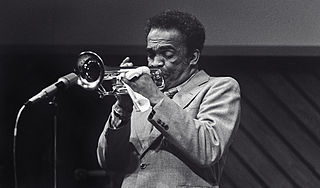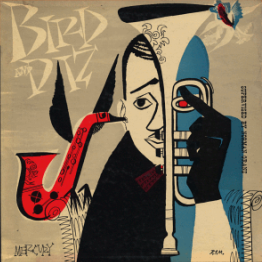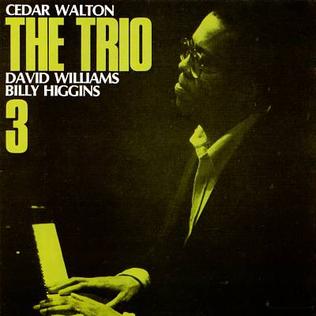Related Research Articles

Charles Parker Jr., nicknamed "Bird" or "Yardbird", was an American jazz saxophonist, band leader and composer. Parker was a highly influential soloist and leading figure in the development of bebop, a form of jazz characterized by fast tempos, virtuosic technique, and advanced harmonies. Parker was an extremely fast virtuoso and introduced revolutionary harmonic ideas into jazz, including rapid passing chords, new variants of altered chords, and chord substitutions. Primarily a player of the alto saxophone, Parker's tone ranged from clean and penetrating to sweet and somber. He was known for the very clear, sweet and articulate note he could produce from the saxophone.
Cool jazz is a style of modern jazz music that arose in the United States after World War II. It is characterized by relaxed tempos and lighter tone, in contrast to the fast and complex bebop style. Cool jazz often employs formal arrangements and incorporates elements of classical music. Broadly, the genre refers to a number of post-war jazz styles employing a more subdued approach than that found in other contemporaneous jazz idioms. As Paul Tanner, Maurice Gerow, and David Megill suggest, "the tonal sonorities of these conservative players could be compared to pastel colors, while the solos of [Dizzy] Gillespie and his followers could be compared to fiery red colors."

Howard McGhee was one of the first American bebop jazz trumpeters, with Dizzy Gillespie, Fats Navarro and Idrees Sulieman. He was known for his fast fingering and high notes. He had an influence on younger bebop trumpeters such as Fats Navarro.
"A Night in Tunisia" is a musical composition written by Dizzy Gillespie around 1940–42, while Gillespie was playing with the Benny Carter band. It has become a jazz standard. It is also known as "Interlude", and with lyrics by Raymond Leveen was recorded by Sarah Vaughan in 1944.

Irving Sidney "Duke" Jordan was an American jazz pianist.
"Confirmation" is a bebop standard composed by saxophonist Charlie Parker in 1945. It is known as a challenging number due to its long, complex head and rapid chord changes, which feature an extended cycle of fifths. The harmonic rhythm of "Confirmation" is noted for its speed and intricacy, typical for the bebop era.

Dial Records was an American record company and label that specialized first in bebop jazz and then in contemporary classical music. It was founded in 1946 by Ross Russell. Notable artists who recorded for Dial include Charlie Parker, who signed an exclusive one-year recording contract with Russell on 26 February 1946, as well as Miles Davis, Max Roach, and Milt Jackson. Dial Records initially pressed its music for the Tempo Music Shop of Hollywood, California, but soon relocated to New York City.

Bird and Diz is a studio album by jazz saxophonist Charlie Parker and trumpeter Dizzy Gillespie. It was recorded primarily on June 6, 1950, in New York City. Two tracks featured on the original pressing, "Passport" and "Visa", were recorded by Parker, without Gillespie and with a different personnel than that of the other tracks, in March and May 1949. The album was originally issued in 1952 in 10" format as a collection of 78 rpm singles on the Verve subsidiary label Clef Records.

This is a list of recordings by American jazz alto saxophonist Charlie Parker. Parker primarily recorded for three labels: Savoy, Dial, and Verve. His work with these labels has been chronicled in box sets. Charlie Parker's Savoy and Dial Sessions have been issued on The Complete Savoy Sessions, Charlie Parker on Dial and Complete Charlie Parker on Dial and The Complete Savoy & Dial Master Takes. His Verve recordings are available on Bird: The Complete Charlie Parker on Verve and The Complete Verve Master Takes.
"Lover Man " is a 1941 popular song written by Jimmy Davis, Roger ("Ram") Ramirez, and James Sherman. It is particularly associated with Billie Holiday, for whom it was written, and her version was inducted into the Grammy Hall of Fame in 1989.
"Yardbird Suite" is a bebop standard composed by jazz saxophonist Charlie Parker in 1946. The title combines Parker's nickname "Yardbird" and a colloquial use of the classical music term "suite". The composition uses an 32-bar AABA form. The "graceful, hip melody, became something of an anthem for beboppers."

Donald Douglas Lamond Jr. was an American jazz drummer.

Complete Charlie Parker on Dial is a 1996 box set release of jazz saxophonist and composer Charlie Parker's 1946–47 recordings for Dial Records. The box set, released by Jazz Classics, features 89 songs, including alternate takes and notes composed by jazz historian and Parker biographer Ira Gitler. John Genarri, author of the book Blowin' Hot and Cool: Jazz and Its Critics singles out the recording of "Lover Man" on this album, noting that "[t]his wrenching, anguished version...has been called Parker's most poetic statement on record" though, says Gennari, Parker himself viewed it as substandard and threatened physical violence against Ross Russell, a Dial records producer, for including it. Gennari also indicates that other tracks included on this CD—"Relaxin' at Camarillo", "Cheers", "Stupendous" and "Carvin' the Bird"—"have struck many listeners as his most joyous and optimistic."

Charlie Parker on Dial: The Complete Sessions is a 1993 four-disc box set collecting jazz saxophonist and composer Charlie Parker's 1940s recordings for Dial Records. The box set, released by the English label Spotlite Records, assembled into a single package the multi-volume compilation albums the label had released by Spotlite on vinyl in the 1970s under the series title Charlie Parker on Dial. The box set has been critically well received. In 1996, a different box set collecting Parker's work with Dial was assembled by Jazz Classics and released as Complete Charlie Parker on Dial.
This article lists Charlie Parker's Savoy and Dial sessions as leader, which were recorded between 1945 and 1948.

The Trio 3 is a live album by pianist Cedar Walton, bassist David Williams and drummer Billy Higgins recorded in 1985 and released on the Italian Red label.

Relaxin' at Camarillo is an album by American jazz saxophonist Joe Henderson recorded in 1979 and released on the Contemporary label. Featuring Henderson with keyboardist Chick Corea, and two rhythm sections-bassist Richard Davis and drummer Tony Williams on two tracks, and bassist Tony Dumas and drummer Peter Erskine on the remaining three.
Lady Bird is an album by saxophonist Archie Shepp, recorded in 1978.
"Now's the Time" is a composition by Charlie Parker. He led the first recording of it, on November 26, 1945.

Young at Heart is an album by trumpeter Howard McGhee and saxophonist Teddy Edwards recorded in 1979 and released on the Storyville label.
References
- ↑ Komara, Edward M. (1998). "Historical Narrative". In Gray, Michael (ed.). The Dial Recordings of Charlie Parker: A Discography. Discographies series. Vol. 76. Greenwood, Connecticut, United States: Greenwood Press. p. 27. ISBN 9780313291685. OCLC 528877878 – via Google Books.
- ↑ Chase, Ronald (7 October 2013). "9. Two State Hospitals (1959—1960)". Schizophrenia: A Brother Finds Answers in Biological Science. Baltimore, Maryland, United States: Johns Hopkins University Press. p. 76. ISBN 9781421410913. OCLC 827119755 – via Google Books.
- ↑ Martin, Henry (2020). Charlie Parker, Composer. New York: Oxford University Press. ISBN 9780190923389.
- ↑ Starr, Kevin (9 September 2011). Golden Dreams: California in an Age of Abundance, 1950-1963. Oxford University Press. p. 475. ISBN 978-0-19-992430-1.
- ↑ "Relaxin' at Camarillo". Learn Jazz Standards. Retrieved 14 March 2017.
- ↑ Gioia, Ted (1998). West Coast Jazz: Modern Jazz in California, 1945-1960. University of California Press. p. 26. ISBN 978-0-520-21729-4.
- ↑ Porter, Roy (1 November 1995). There And Back. A&C Black. p. 58. ISBN 978-1-871478-30-3.
- ↑ Lord, Tom (1997). The Jazz Discography . Lord Music Reference. p. 170. ISBN 978-1-881993-01-8.
- ↑ Jazz Forum. For Jazz, sp. z o. o. 1982. p. 18.
- ↑ Jazz Journal International. Billboard Limited. 2009. p. 36.